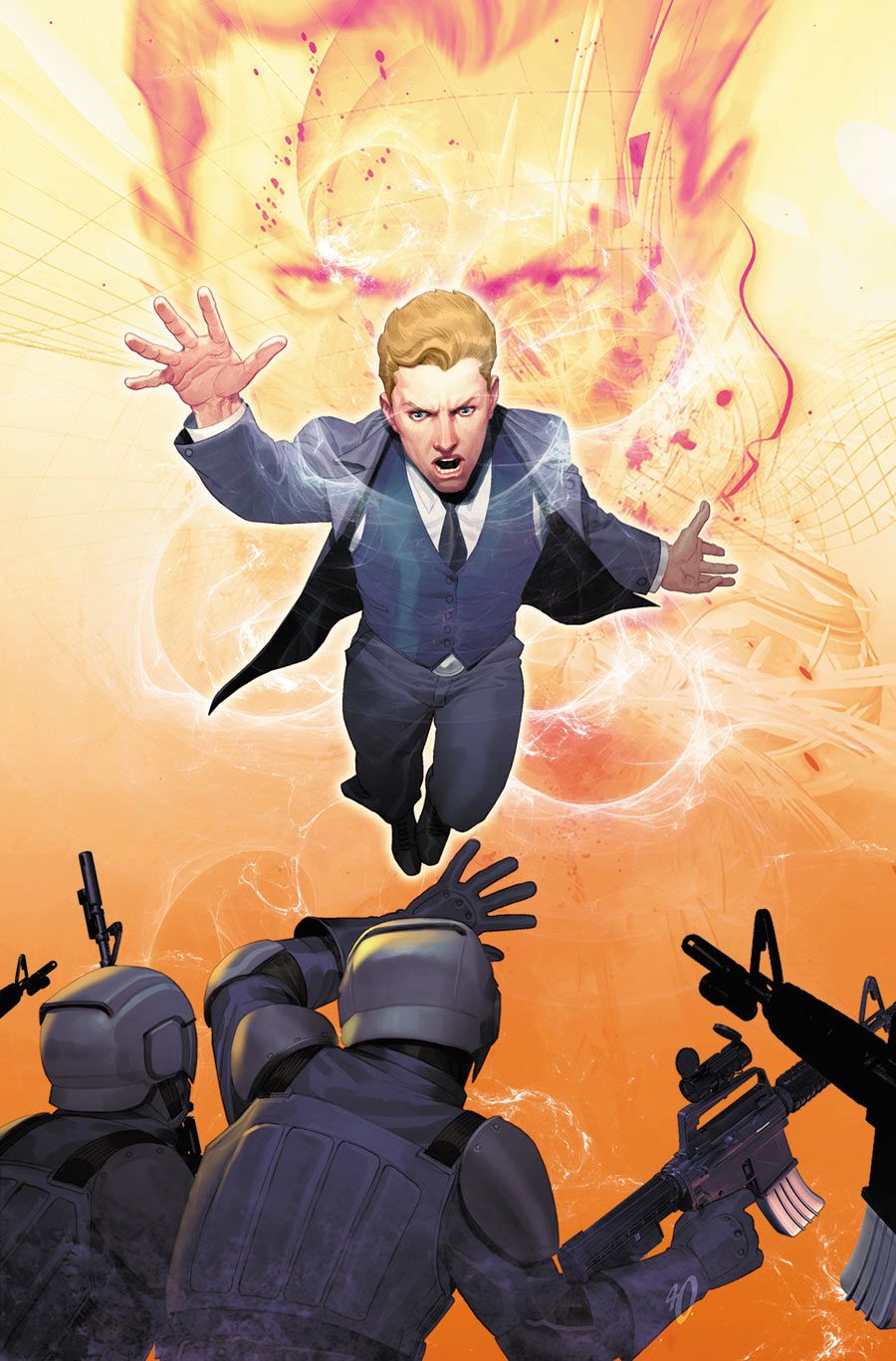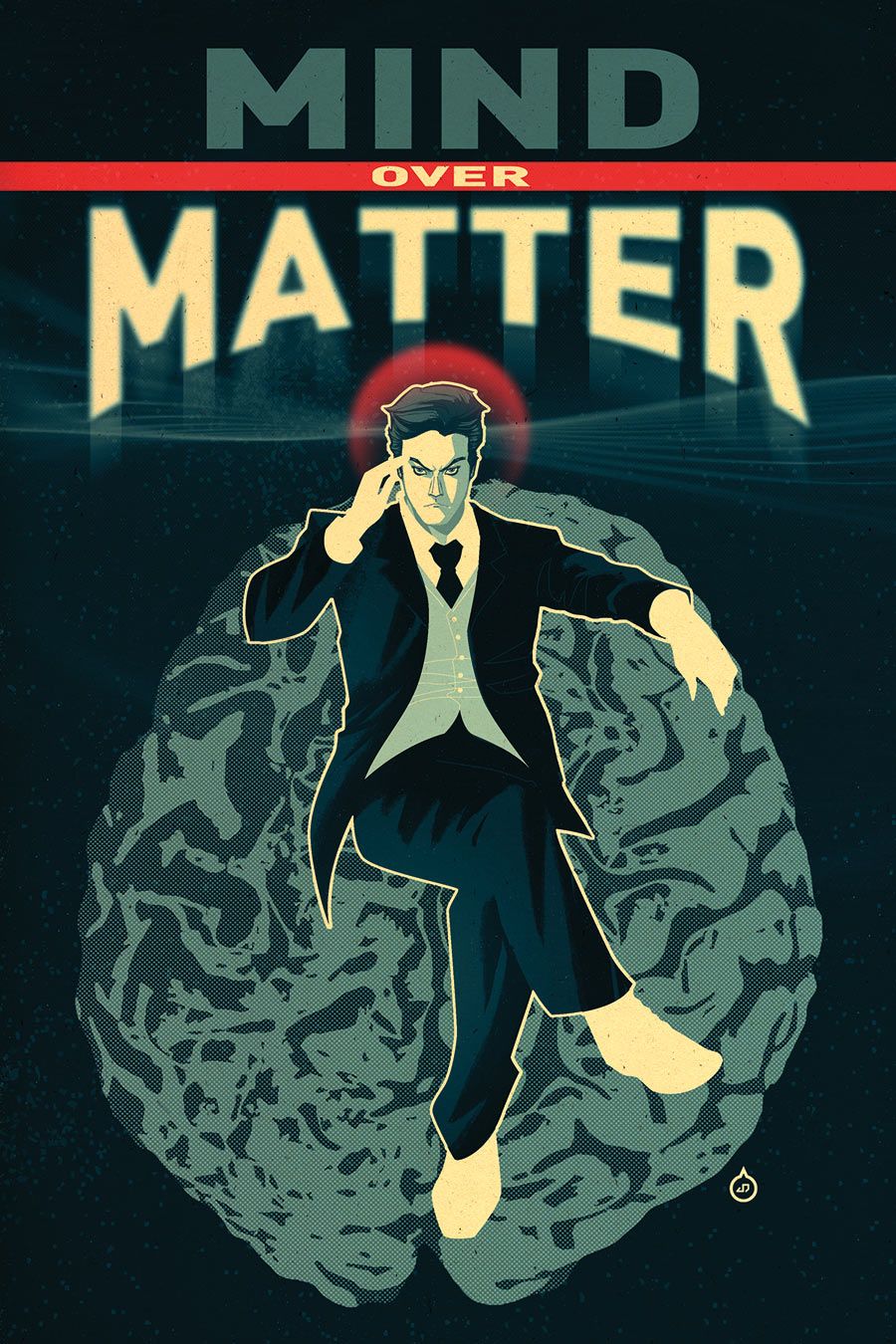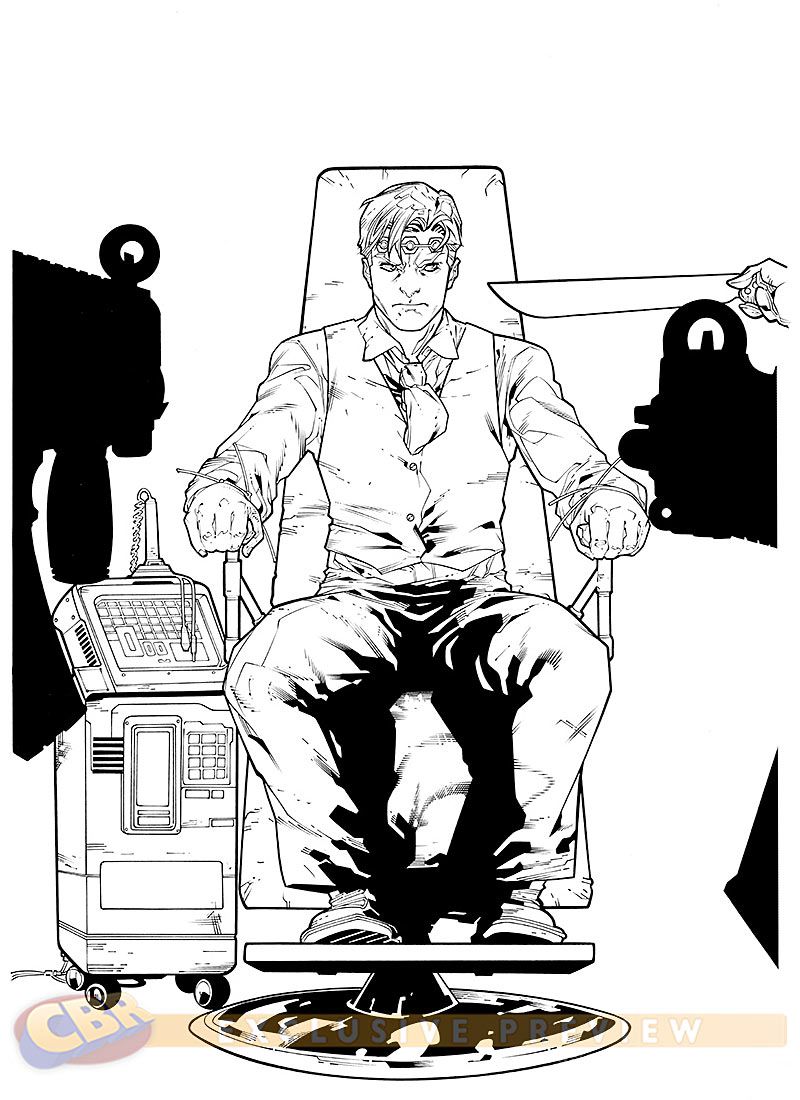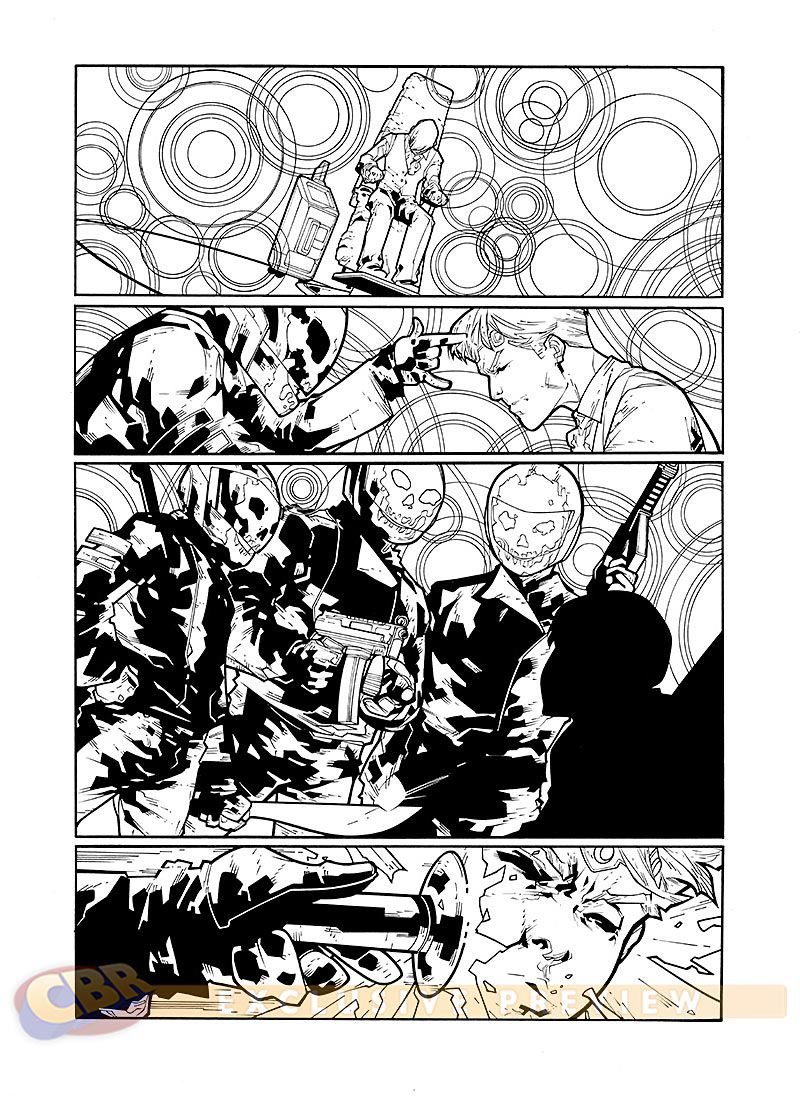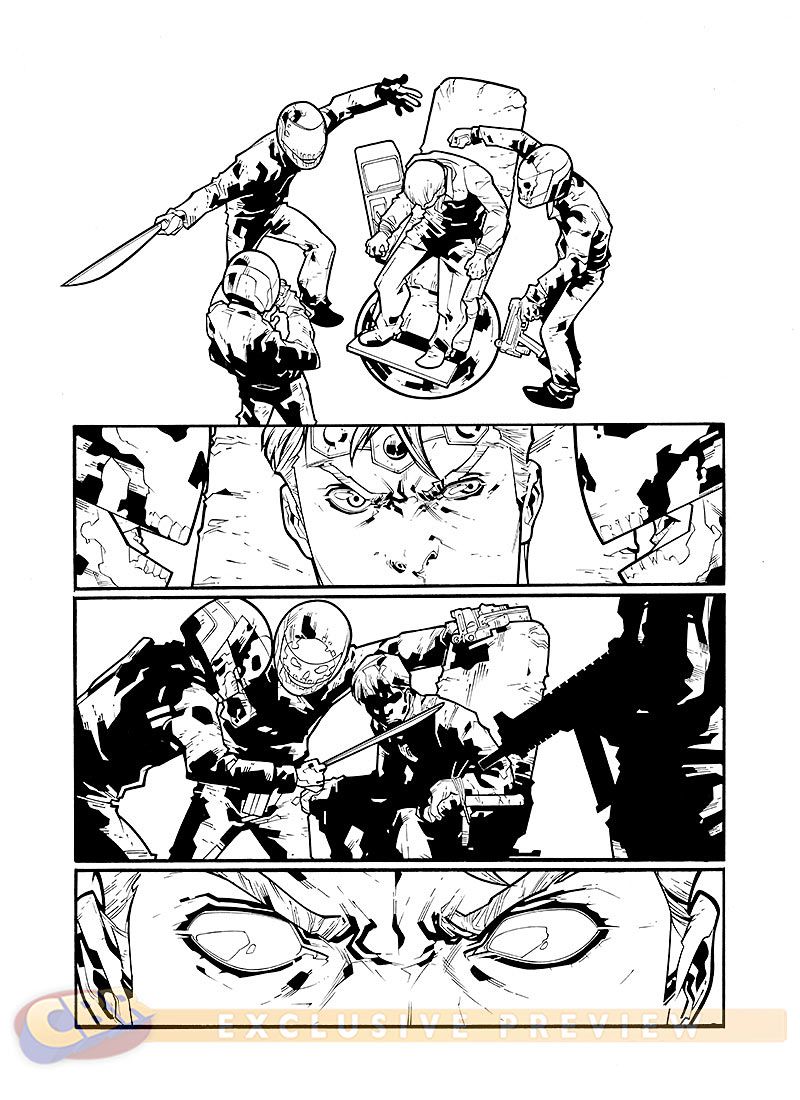The 1960s may have been the Golden Age for high class super spies, but writer Fred Van Lente is out to prove that the modern era is full of espionage action all its own with his new Dark Horse Comics series.
Launching this September, "Brain Boy" will step out of the pages of "Dark Horse Presents" and into a four-issue miniseries. The latest expansion of Dark Horse's growing superhero line (which also includes X, Ghost and the incoming "Catalyst Comix") isn't an original DH creation, however. The psychic youth known as Matt Price got his start in the Cold War comics of Dell Publishing by Herb Castle, Gil Kane and Frank Springer. But this new take from Van Lente and artist RB Silva will push the psychic Secret Service agent into a whole new level of intrigue.
CBR News spoke with the writer about his plans for the miniseries, how his status as a comics history nerd and a former United Nations employee impacted the story, what secret tricks await in Brain Boy's world of psychic warfare and why writing a conceited jerk with super powers is the most fun you can have.
CBR News: Fred, what was your first response to the idea of new "Brain Boy" comics? That original series is well off the beaten path in terms of its history and tone, I think.
Fred Van Lente: What happened was that Jim Gibbons at Dark Horse asked me if this would be something I'd be interested in, and just hearing there was a '60s series called "Brain Boy" made me go, "Well, why wouldn't I do that? It's so crazy sounding." And when I got the Dark Horse collection [of the original series], the interesting thing I found about "Brain Boy" was that it was this curious artifact of comics past. This was a weird period in history for Dell. Dell was arguably the largest American comic company of all-time because they had the Disney license. They published "Walt Disney's Comics And Stories" which was the highest circing [sic] comic ever in the history of the United States. But then Dell lost that license to Gold Key, and they ended up trying to keep their comics line alive by generating a bunch of crazy series.
And the crazy thing about "Brain Boy" as an artifact of comics history was not just that it was an original series to Dell. Also because Dell was allied with Disney, they were one of two publishers that never joined the Comics Code [censorship organization]. So these are non-Code Approved early '60s comics where he has a [minority] girlfriend, he's commanding people to kill themselves with mental powers, and it makes it just this completely insane artifact because it was this '60s era comic without the patina of moralism that you'd get in most comics back then. It's completely nuts. It's like Hollywood before the Hayes Code with those Mae West movies where there's all this sex talk. It's just like seeing sex talk in black and white.
So there are all sorts of concepts I'm taking form the original series and putting them in this new book, but I'm also trying to inject a certain degree of Tom Clancy, techno-thriller style stories into it.
These days, Dark Horse has been launching a lot of these new superhero stories with three-part stories first appearing in "Dark Horse Presents" before the hero shifts to a full series. How did you approach that three-act story with artist Freddie Williams in terms of letting it set up the high concept for the whole comic?
In the original Dell series, the narrator says our Brain Boy Matt Price works for the Secret Service, but then he gets sent off on fairly generic "James Bond, Jr." type adventures. But what I thought was really interesting was that despite the fact that the execution of the Secret Service idea -- with all due respect to my predecessors -- was sloppy writing, it would be really cool if this actually was the U.S. Secret Service. It occurred to me that if you were in a world that had telepaths and telekinetics -- in that world where psionics are real, the first people who would want to get in on this action would be bodyguard type organizations looking to protect people from psychic assassins.
So a lot of the book, like any other Cold War/espionage milieu, is about Brain Boy and his colleagues trying to outwit the psychics who want to do the President of the United States harm. When you add on to that the even bigger level of paranoia in that Brain Boy is not technically a Secret Service agent but is a defense subcontractor working for the Secret Service? Well, it's kind of funny that we're talking about this the Monday after a military defense contractor stole a bunch of NSA documents, gave them to "The Guardian" in the U.K. and then fled to Hong Kong. [Laughs] I thought that was interesting. That guy wasn't an actual NSA agent. He was a subcontractor!
"Brain Boy" kind of reflects that same idea where Matt works for Albright Industries, which is Captain Midnight's company. That integrates it into the larger "Dark Horse Universe" if we call the superhero stuff that. You already saw the Albright connection in part two [of the "DHP" story] with his encounter with the call center, and we'll be getting more into that and seeing who runs the "Biovancement" division of Albright Industries in part three. Her name is Georgina T. Delacourt, which is a needlessly obtuse reference to George Delacourt who founded Dell Publishing. [Laughs] That's an Easter Egg for gigantic comics history nerds like me. But you'll be seeing a lot more of Georgina in future installments of the series.
I think it's interesting to put a guy who can read minds like Brain Boy into situations where he can't trust anybody. Even with that ability, there's still limits to the powers and what they can accomplish for him if everyone is lying to him all the time and trying to find technological ways to block his powers.
You make sure in the first story to not play his powers as a curse either. It's not the angsty take we see often with this kind of idea, but aren't you also exploring the ways he's had terrible things done to him that have nothing to do with his abilities?
Yeah. How close Brain Boy's origin is to the original comic I won't reveal here. But we know he's an orphan, and we know he was raised by Biovancement and Albright, so he views them as a kind of surrogate. It's kind of a cliche in comics to do the guy who was raised by the government and is then shocked to learn that the government is doing evil things with him. I wanted a very cynical, brash character who was very aware that the government is doing terrible things! [Laughs] And he's cool with that as long as the checks cash, and he's got a nice car to drive, and he can take girls out to nice restaurants. How do you take a guy like that to his next stage as a character where you'll want to root for him nonetheless? That's the kind of stuff I get excited by.
You developed the modern take on Brain Boy with Freddie Williams II for "DHP," and now the miniseries welcomes RB Silva. How are you approaching the next phase of his world considering RB's style?
Freddie and RB are both terrific, and they have similar styles in some very specific ways. Freddie spent a lot of time thinking about how Matt's powers worked and came up with this image where his eyes go black anytime he uses his powers. Since psychic powers are such a staple of comics, how do we make our hero interesting? Freddie solved that with the eyes and these concentric rings coming out of Matt's head, and RB has really run with that. With RB we're trying to not only set up Matt's world, but we're also working to set up Matt as his own character.
The joke I made on Twitter was that the series should just be called "Psychic Ass Hole." That's kind of his attitude towards life. I kept kind of picturing the TV show "House" but with a psychic. This guy is literally one step ahead of you all the time, and beyond that, he's kind of like Joffrey from "Game of Thrones" in that he's been brought up to think he's the greatest thing since sliced bread. It's tough to do a coming of age story about a guy in his late teens or early 20s who already knows everything because he can read your mind. And so what are the experiences he goes through that can change him, and how do we find that humanity in him as he starts meeting people from different walks of life and causes worth fighting for? There's a line I think I cut from the first issue about how Albright focuses on solving the problems of the rich. How do you go from there to really becoming a hero. As cliche as that sounds, that's what the book is ultimately about.
So in the "Dark Horse Presents" serial, we've got a situation where he's trying to protect that G8 Conference, which is one thing the Secret Service does. And in the miniseries, this first arc involves another aspect of the Secret Services job. Until I researched this I didn't realize it, but the Secret Service aside from protecting the President also protects all heads of state who are on American soil. So the series takes place during the UN General Assembly, which is interesting for me because that's what I did before I became a professional comics writer. I worked in the Ugandan Consulate as an archivist for three years. It's fun to revisit my old stomping grounds. The United Nations General Assembly is like Comic-Con for the Secret Service because all of the sudden, 110 heads of state show up. It's this massive operation where they have to protect these people and deal with all these parties and receptions and awards ceremonies that go on all around New York during the General Assembly during a week in September.
The series is about what happens when Emil Ricorta, who was a character from the original series, comes calling. He's the president of South America's largest oil nation. He has a shady past and is kind of a leftist. He may have a passing resemblance to a head of state who recently passed away but was still alive when I started writing this story. [Laughs] Matt is assigned to protect him when all hell breaks loose. It's a psychic "Spy Vs. Spy" romp through the streets of New York City.
Your description of discovering the Secret Service's duties reminds me of watching "Justified" where the show is constantly reminding you, "Wow, the Marshall Service does a ton of stuff!"
Exactly. It's not just being a bullet catcher for the President. There's a little more involved. At some point we'll do a counterfeiting arc because the Secret Service is technically a part of the Treasury. [Laughs] And there are conflicts to manage with the CIA. Of course there's tension there because the CIA would love the Secret Service to spy on the people they're supposed to protect. But the Secret Service won't do that. I mean, I'm sure the CIA understand that in real life, but there's a great tension in the idea that you might not be able to trust the person who is supposed to be your bodyguard. So the CIA comes to Matt, and they want dirt on Ricorta. And what they dangle in front of Matt is secrets about Albright Industries, including a dossier on his parents who he never met and knows nothing about. Something there isn't on the up and up, and the CIA implies that if he does some psychic snooping, they'll give him the dirt on his parents. The ball is rolling from there, and there's a lot of international backstabbing -- both psychically and of the actual kind.
Freddie Williams II's design for the revamped Brain Boy
Part 3 of the introductory "Brain Boy" serial arrives June 19 in "Dark Horse Presents" #25, and "Brain Boy" #1 debuts September 11.


